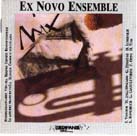Ex Novo Ensemble (CD)

CD PAN 3053
CD PAN 3053
Music by Ivan Vandor, Michele dall'Ongaro, Gérard Zinsstag, Daniele Lombardi, Lucia Ronchetti, Gaetano Giani Luporini, Franco Oppo, Daniele Tosi.
Tempor (1991-92) for flute, clarinet, violin, viola, cello and piano
Temperature, temperament: warmth, colour. Or only anguish, in Time, which Latins have handed down to us with a neuter gender. Never neutral, however, and capable of assuming here three different features: "incarcere, suspendu, manipule".
Nothing is but as it appears. At the beginning the "flat" and obsessive pizzicato of the bows, a fixed horizon as the bars of a prison and an icy rebound to the tempting strokes of a piano, captivates us. Noises in solitude: echoes, rumblings, repetitions, scansions suffered by people deprived of liberty. (The broken dream of the prisoner, the sadism of the person deceiving him: listen to Dallapiccola, Montale).
But when does this dream occur? Is it the dawn or the nigth to set in on those impotent visions? Refined instrumental techniques: pitch divarications capable of producing bewildering conflicts; the sound is time and in time it becomes a perceptive structure: repetition transforms itself into concentration, the intervals' economy causes the swaying of a pendulum, which is enchanting.
"Resonance spectrale", as it is pointed out in the score; and in the conclusive episode - the manipulated time - the intention is to explicitly reach the illusion: "souffle sans emission du son". But in that very moment we hear the flute.
The boundary between listening and vision gets weaker, the persistence of sound is not in the instrument anymore but in the air and only later in the mind: the same was experimented by Luigi Nono with his sonoscoop in his Freiburg studio. How many pianos are possible, hearable? "Piano, piano, piano, piano, piano, fortissimo nel mio cuore", he wrote, thinking of Schubert.
Utopia of the infinite sound, genetic manipulation very much longed for by composers, their faustian delirium. It is not necessary to barter the soul with eternity, it will suffice "to increase gradually the bow's pressure, thus producing the emission of very far harmonics". The estrangement is guaranteed, provided that the performance is effective. The initial "flatpizzicato" becomes at the end a "harped and enfeebled pizzicato".
